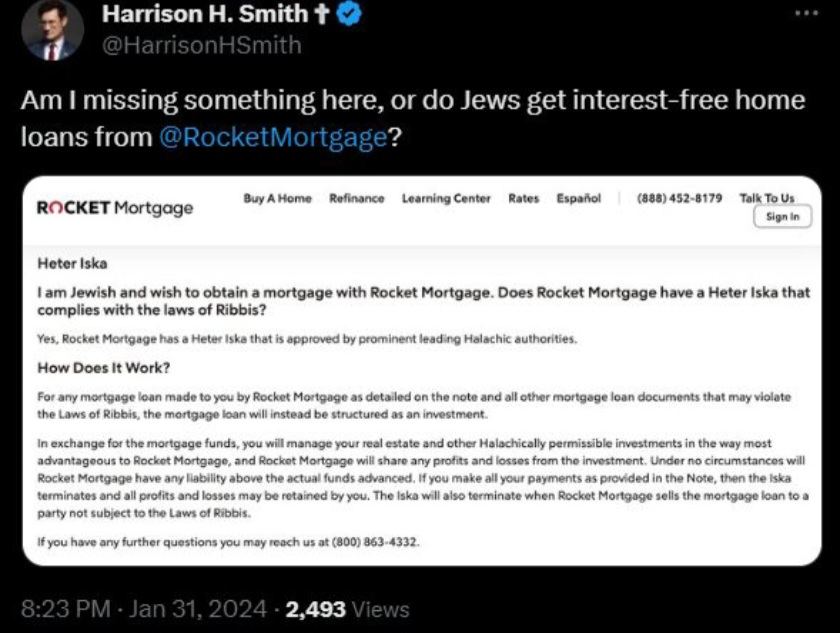Rocket mortgage jewish loans opens up a fascinating intersection of modern digital lending and age-old community-based financial traditions. It’s a topic that captures the way technology can influence personal finance while still respecting deep-rooted cultural values. As you explore how Rocket Mortgage operates alongside the unique practices found in Jewish loan communities, you’ll discover new perspectives on what borrowing can look like in today’s diverse society.
At its core, Rocket Mortgage is known for streamlining the home loan process in the US, offering a variety of options through its fully digital platform. On the other hand, Jewish community loans are steeped in a tradition of interest-free lending, often managed by organizations dedicated to helping members achieve important life milestones like homeownership. By comparing these two approaches, you’ll gain insight into eligibility requirements, application steps, and how borrowers align their financial choices with their faith and values. This blend of innovation and tradition shapes the modern landscape of home financing.
Rocket Mortgage and Its Digital Loan Solutions in the US Housing Market
Rocket Mortgage stands as a prominent player in the US housing finance landscape, known for revolutionizing how Americans apply for and secure home loans. Its core offerings include a transparent, fully digital mortgage process that empowers borrowers to manage applications and documents entirely online. This innovation has set a new industry standard by making home financing faster, more accessible, and user-friendly for a wide range of clients.
Core Offerings and Services of Rocket Mortgage
Rocket Mortgage specializes in simplifying home loans through digital technology. Borrowers can initiate, manage, and track the status of their applications from any device, reducing the need for in-person meetings and physical paperwork. The platform offers:
- Conventional fixed-rate and adjustable-rate mortgages
- FHA, VA, and USDA government-backed loans
- Refinancing options for existing mortgages
- Customizable loan terms and down payment flexibility
Transformation of the Mortgage Process Through Digitalization

The digital approach by Rocket Mortgage has fundamentally transformed traditional lending. Applicants benefit from real-time updates, secure online document uploads, and automated calculations of affordability and rates. This seamless experience minimizes delays and gives clients greater control over their mortgage journey, from pre-approval to closing.
Variety of Loan Products Offered
Rocket Mortgage’s diverse product suite is designed to meet the needs of different types of homebuyers:
- First-time buyers can access special programs with low down payments.
- Veterans and service members are eligible for VA loans with favorable terms.
- Jumbo loans cater to clients seeking higher loan amounts for luxury properties.
- Streamlined refinancing options are available for homeowners looking to reduce rates or change terms.
Jewish Loan Traditions and Community Lending Practices
Jewish communities have long-standing traditions of lending that emphasize mutual aid and ethical finance. Interest-free loans, known as “gemachs,” are a hallmark of these practices, aiming to support individuals and families through periods of need or opportunity without the burden of accumulating debt.
Historical and Cultural Context of Jewish Lending
Central to Jewish tradition is the value of tzedakah (charitable giving) and providing assistance to those in need. Historically, Jewish loan funds were organized within communities to help members achieve financial stability, often for education, small business, or housing needs. These funds operate on principles rooted in biblical injunctions against charging interest to fellow community members, reinforcing a culture of support and collective responsibility.
Modern Jewish Community Loan Organizations
Today, numerous organizations carry forward these traditions, offering interest-free or low-interest loans for a wide range of purposes. The table below highlights some notable examples:
| Organization Name | Location | Loan Type | Eligibility |
|---|---|---|---|
| Hebrew Free Loan Association of San Francisco | San Francisco, CA | Interest-free personal and business loans | Bay Area Jewish residents |
| Hebrew Free Loan Society | New York, NY | Education, housing, emergency loans | Jewish community in New York region |
| Jewish Free Loan Association | Los Angeles, CA | Medical, adoption, home purchase loans | Southern California Jewish community members |
| The Hebrew Free Loan of Baltimore | Baltimore, MD | Interest-free loans for various needs | Jewish residents of Maryland |
Rocket Mortgage Eligibility Criteria and Application Procedures

Securing a loan through Rocket Mortgage involves meeting specified eligibility requirements and following a streamlined application process. This ensures borrowers are well-qualified while making the process accessible and efficient.
Eligibility Requirements for Rocket Mortgage Loans
Applicants must generally meet the following criteria:
- Minimum credit score (varies by loan type, typically 620 or higher for conventional loans)
- Steady income and verifiable employment history
- Sufficient down payment, depending on loan program
- Acceptable debt-to-income ratio, usually below 45%
- Legal residency or citizenship in the United States
Step-by-Step Application Process
The application process leverages Rocket Mortgage’s digital platform to guide borrowers from start to finish. The steps are Artikeld in the following table:
| Step | Action | Required Documents | Notes |
|---|---|---|---|
| 1 | Online pre-approval | Basic personal and financial info | Soft credit check performed |
| 2 | Submit loan application | Proof of income, employment verification | Choose loan type and terms |
| 3 | Upload documentation | Tax returns, W-2s, bank statements | Digital uploads via secure portal |
| 4 | Credit and financial review | Consent to full credit check | Automated underwriting process |
| 5 | Property appraisal and verification | Property information | Third-party appraiser involved |
| 6 | Loan approval and closing | Final signatures, closing disclosures | Funds disbursed for purchase/refinance |
Verification of Applicant Information
Rocket Mortgage uses a combination of automated tools and manual reviews to verify applicants’ identity, employment, income, and credit history. This process balances speed and accuracy, protecting both the borrower and lender while ensuring compliance with federal lending regulations.
Comparing Conventional Loans and Jewish Community Loans: Rocket Mortgage Jewish Loans
Understanding the distinctions between conventional loans, such as those offered by Rocket Mortgage, and Jewish community loans can help borrowers align their financing choices with their values and needs.
Comparison of Loan Features, Terms, and Practices
The table below summarizes key differences and similarities between these two lending models:
| Loan Type | Interest Structure | Repayment Terms | Community Involvement |
|---|---|---|---|
| Conventional (Rocket Mortgage) | Interest-bearing, market-based rates | Standardized, contract-based, flexible term options | Minimal, commercial transaction |
| Jewish Community Loan | Interest-free or nominal administrative fees | Flexible, community-determined repayment schedules | High, mutual support and personal references required |
Advantages and Disadvantages for Borrowers
Choosing between these loan types involves weighing different priorities:
- Conventional loans offer greater loan amounts, faster processing, and broader eligibility but may not align with faith-based values for some borrowers due to interest charges.
- Jewish community loans are designed to relieve financial burden through interest-free lending and community support, but may have stricter eligibility tied to community membership and lower maximum loan amounts.
Faith-Based Principles and Their Role in Lending Practices
Faith-based values exert a significant influence on lending practices within Jewish communities, leading to unique loan structures and eligibility requirements that prioritize ethical and communal considerations.
Influence of Jewish Religious Values in Lending
Jewish law prohibits charging interest (ribit) on loans between community members, driving the creation of interest-free loan societies. These practices are not just financial but are expressions of religious duty and communal responsibility, reinforcing networks of trust and assistance.
Mainstream Lenders and Cultural Accommodation
Mainstream lenders like Rocket Mortgage primarily operate within secular financial frameworks but do offer some flexibility to accommodate cultural needs. While the standard loans are interest-based, Rocket Mortgage provides customer service and loan options that respect diversity and can work with clients observing religious holidays or seeking specific closing arrangements. However, they generally do not have dedicated faith-based loan programs.
Programs and Resources for Faith-Based Communities
Some financial institutions partner with local organizations or offer educational resources about maintaining religious observances during the home-buying process. While not widespread, there is growing interest in developing programs that address the intersecting needs of faith and finance, including grant opportunities or targeted financial counseling for religious communities.
Procedures for Jewish Community Home Purchase Loans
Applying for a Jewish community loan to purchase a home involves a process that is both rooted in tradition and tailored to maintain high levels of trust and accountability within the community.
Steps in the Application Process for Jewish Home Loans, Rocket mortgage jewish loans
Applicants generally navigate through several stages when seeking a community-based loan. Each step is designed to ensure fairness and transparency:
- Initial inquiry and eligibility screening by the loan society.
- Submission of a formal application detailing financial need and intended use.
- Provision of personal and financial references, often from community members.
- Interview or meeting with a review committee to discuss the loan request.
- Committee decision and notification of approval or denial.
- Agreement on repayment terms and signing of promissory notes.
- Disbursement of funds, typically via check or direct deposit.
Assessment and Distribution Methods
Jewish loan organizations assess applicants’ need, character, and ability to repay, often relying on trusted references and personal interviews. Loans are distributed with minimal bureaucracy, emphasizing discretion and dignity for the borrower.
- Review of financial documentation and references
- Evaluation by a volunteer committee comprised of community leaders
- Flexible repayment plans based on circumstances
Typical Documentation Required
Common requirements for Jewish loan societies include:
- Proof of identity (government-issued ID)
- Proof of residence within the eligible community area
- Evidence of financial need or hardship
- Personal references, ideally from within the community
- Documentation of employment or income (if available)
- Credit references or prior borrowing history (optional)
Case Studies and Real-Life Loan Decisions
Real-life scenarios provide valuable insights into how individuals and families choose between Rocket Mortgage and Jewish community loans, shedding light on the practical and emotional factors involved.
Scenarios Highlighting Loan Choices and Outcomes
The following table illustrates actual cases of borrowers with differing needs and community ties:
| Scenario | Loan Chosen | Outcome | Lessons Learned |
|---|---|---|---|
| Young couple, first home, limited savings | Jewish community loan | Secured interest-free funding, manageable repayments, strong community support | Personal ties and cultural fit can outweigh speed and loan amount |
| Mid-career professional, relocating for job, needs quick closing | Rocket Mortgage | Fast digital approval, flexible terms, higher interest rate | Convenience and loan size prioritized over community involvement |
| Retired couple downsizing, moderate equity, faith-driven values | Combined approach (community loan for down payment, Rocket Mortgage for balance) | Achieved homeownership while limiting debt burden | Hybrid strategies can balance financial and spiritual needs |
Impact of Values on Loan Decision-Making
Personal and community values often play a decisive role in loan choices. Borrowers who prioritize religious observance or community engagement may prefer interest-free options despite their limitations. Conversely, those facing tight deadlines or requiring substantial funds might lean toward conventional lenders for their efficiency and scale.
Challenges and Considerations in Aligning Mortgages with Religious Values
Borrowers aiming to honor Jewish religious principles while securing a mortgage can encounter unique challenges, especially when navigating a primarily interest-based financial system.
Potential Conflicts and Solutions
Common issues include the incompatibility of standard mortgage interest with religious prohibitions, as well as limited availability of large, interest-free loans. Strategies to address these challenges may involve seeking rabbinic guidance, negotiating terms, or combining multiple funding sources.
- Consulting with religious authorities to explore permissible financial structures
- Utilizing community resources for smaller, supplemental loans
- Negotiating payment schedules or interest rebates where possible
- Developing creative, hybrid financing solutions
Real-Life Experiences of Navigating Faith and Finance
“I wanted to remain true to my values, so I worked with my rabbi and the loan committee to structure my home purchase in a way that avoided traditional interest. It took longer, but it was worth it for my peace of mind.”
“Ultimately, I had to use a conventional loan for part of my home purchase, but by supplementing with a gemach loan, I minimized my reliance on interest and maintained my commitment to community values.”
These experiences highlight the importance of flexibility, community support, and a willingness to seek guidance when balancing religious observance with modern financial realities.
Emerging Trends in Faith-Based Lending and Digital Mortgages

The landscape of lending is rapidly evolving as technology and faith-based values intersect, creating new possibilities for borrowers and lenders alike.
Integration of Technology in Faith-Based Lending
Faith-based lending organizations are increasingly adopting digital tools to streamline applications, manage funds, and reach wider audiences. Secure online portals, digital document verification, and virtual committee meetings are becoming more common, enhancing efficiency and accessibility.
Adapting Digital Platforms to Cultural Preferences
Innovative lenders like Rocket Mortgage are exploring ways to better serve diverse communities. By offering multilingual support, flexible scheduling, and customizable loan products, digital platforms have the potential to accommodate varying religious and cultural needs.
Potential Partnerships and Innovations
There is growing interest in partnerships between mainstream financial institutions and community-based lenders. Pilot programs, such as faith-friendly mortgage products or co-branded educational initiatives, are emerging in select markets. These collaborations seek to bridge the gap between conventional finance and the specific preferences of faith-driven borrowers, paving the way for a more inclusive and adaptive home financing landscape.
Summary
In summary, the relationship between rocket mortgage jewish loans highlights both the possibilities and challenges that come with balancing financial needs, technology, and personal values. Whether you prefer the convenience of digital mortgage applications or feel drawn to the supportive atmosphere of community lending, understanding these options empowers you to make informed decisions on your path to homeownership. As the industry evolves, there’s no doubt that faith-based lending and digital platforms will continue to find new ways to serve diverse communities.
FAQ Corner
Are there specific Rocket Mortgage products for the Jewish community?
Rocket Mortgage does not currently offer loan products exclusively tailored for the Jewish community, but it welcomes applicants from all backgrounds and supports a wide range of mortgage needs.
Can I apply for both a Rocket Mortgage and a Jewish community loan at the same time?
Yes, you can explore both options, but you should review the terms and eligibility for each and consult with financial advisors to avoid conflicts or overextending your finances.
Do Jewish loan organizations offer mortgages for any type of home?
Jewish community loan organizations may have restrictions on loan amounts, property types, and locations, so it’s important to check with the specific organization for their guidelines.
How long does it take to be approved by Rocket Mortgage compared to a Jewish community loan?
Rocket Mortgage’s digital process can provide approvals within days, whereas Jewish community loans may take longer due to committee reviews and community-based decision-making.
Is my credit score important for Jewish community loans?
While Rocket Mortgage relies heavily on credit scores, many Jewish community loans focus more on personal references and community involvement, though some may check your financial background.
